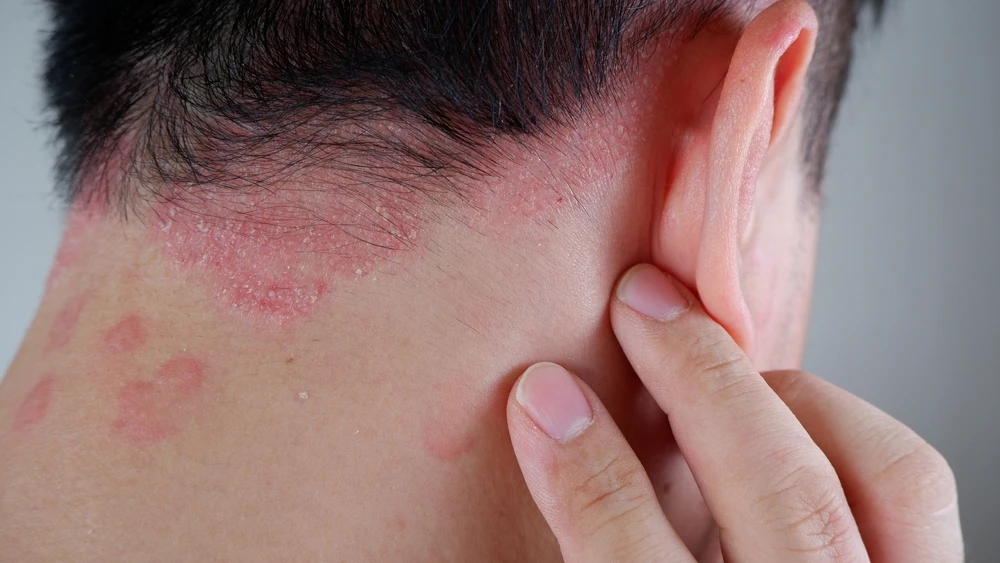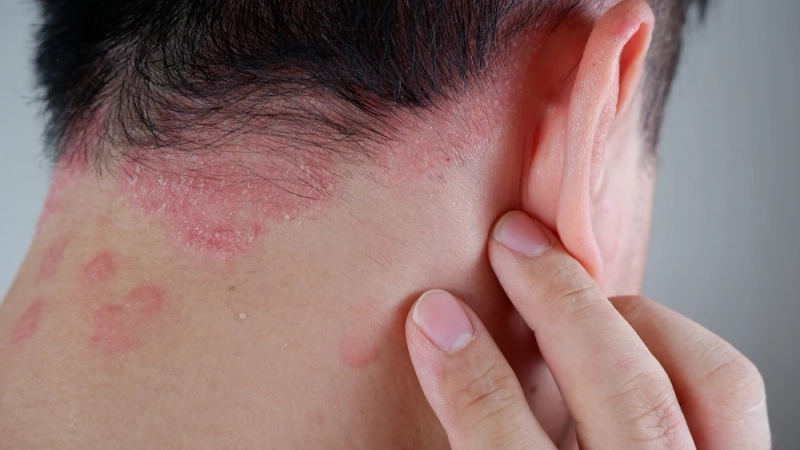
Psoriasis is a skin condition that causes red, scaly patches, which can sometimes resemble a rash. While the symptoms can be noticeable and sometimes uncomfortable, many people wonder whether is psoriasis contagious. To clarify this common misconception and understand more about the condition, keep on reading the blog.
What Triggers Psoriasis?
While psoriasis manifests on the skin, it is an autoimmune disorder where the immune system mistakenly attacks the body’s cells. This overactive immune response leads to rapid skin cell turnover, causing cells to build up quickly and form thick, scaly patches.
Plaque psoriasis is the most common form, and it typically causes lesions to appear on areas like the elbows, knees, and scalp, though they can appear anywhere on the body. These patches are often itchy, swollen, and painful, sometimes cracking and bleeding. Other variations of psoriasis can result in smaller red spots, pustules, or widespread red patches with scaling.
How Do People Develop Psoriasis?
Psoriasis tends to run in families, as certain genes are linked to the condition. If someone in the family has psoriasis, one may inherit the same genes, which can increase the chances of developing it.
However, having these genes alone is not enough to cause psoriasis. A trigger, such as a physical injury (like a cut or sunburn), an infection (such as strep throat), stress, certain medications, or even cold weather (which can lead to dry, cracked skin) is needed to activate the disease.
It is important to note that while the question of whether is psoriasis contagious may be worth pondering, the answer is clear, being around someone with the condition will not cause it to develop. Once triggered, psoriasis often becomes a chronic condition, meaning most people will live with it for life.
Psoriasis: Myths and Facts About Physical Contact
In the past, psoriasis was often mistaken for leprosy, leading to the false belief that it was contagious. However, research suggests that psoriasis is not spread through physical contact. One cannot catch it from touching someone with the condition, nor can it be transmitted by kissing, having sex, or sharing swimming pools.
Psoriasis is caused by genetic factors, not by poor hygiene, diet, or lifestyle. It is not something that can be caught by others, nor does it pose a risk to those around someone with the condition.
Despite this, there is still a stigma surrounding psoriasis, which can be difficult for those who have it. People may feel self-conscious about the visibility of their patches, leading them to hide their symptoms or avoid social interactions.
If one has psoriasis, whether friends, family, or coworkers, it is essential to help them break down misconceptions. Compassion and understanding can make a significant difference.
How to Help Break the Stigma
One way to reduce the stigma associated with psoriasis is by educating the people around it. Many people may not know that psoriasis is an autoimmune disorder and that it is not a result of poor hygiene or a lifestyle choice.
For those without psoriasis, it is important to be supportive. It is essential to show empathy and understanding toward individuals with the condition.
Managing Psoriasis
Although psoriasis is a lifelong condition, it can usually be controlled with proper treatment. There is no cure for psoriasis, but various treatment options can help manage symptoms and reduce flare-ups. Treatments may include:
Topical Treatments: Steroid creams, vitamin D analogs, and coal tar treatments can help reduce inflammation and slow the growth of skin cells.
Phototherapy: Exposure to ultraviolet (UV) light, under controlled conditions, can help improve symptoms.
Systemic Treatments: For severe cases of psoriasis, oral medications or biologic drugs (injections or infusions that target the immune system) may be prescribed.
Lifestyle Changes: Moisturizing regularly, avoiding triggers, managing stress, and maintaining a healthy diet can help prevent flare-ups and manage symptoms.
Psoriasis Research: Enrolling in psoriasis research can be a way to reduce and manage the symptoms of the condition. Certain clinical organizations are working diligently to address psoriasis and offer potential treatment options for those affected.
Is Psoriasis Contagious or Not – The Truth Behind the Myth
Is psoriasis contagious or not? The truth lies in the fact that it is an autoimmune disease. This means that it is caused by an overactive immune system that mistakenly attacks healthy cells, not by a virus or bacteria that can be passed from one person to another. In other words, psoriasis is a genetic and immune response disorder, not an infectious disease.
Because psoriasis is not caused by germs or pathogens, it cannot be spread at all.
The Real Impact of Psoriasis: Beyond the Skin
Psoriasis is often seen as just a skin condition, but its effects go far beyond what meets the eye. While the physical symptoms include red, inflamed patches of skin. These are the most noticeable ones; however, psoriasis can also take a toll on a person’s mental and emotional health. The visible nature of psoriasis can lead to feelings of embarrassment, low self-esteem, and social isolation, as people may feel self-conscious or worried about how others perceive them. This can make everyday interactions, from socializing with friends to professional engagements, more difficult.
But psoriasis does not just affect the skin. Many people with psoriasis also experience joint pain or stiffness, a condition known as psoriatic arthritis, which can limit mobility and further impact quality of life. Furthermore, the chronic nature of psoriasis means that flare-ups can be unpredictable, adding an element of uncertainty to a person’s routine and activities.
Despite these challenges, it is important to remember that psoriasis is treatable. Advances in potential treatment options in dermatology have made it possible for many people to manage their symptoms effectively.
Conclusion
Is psoriasis contagious or not? The answer is that it is not. However, living with psoriasis may require some adjustments, but with proper treatment and support, most people with this condition can lead fulfilling lives. Additionally, awareness and compassion from society can help individuals with psoriasis feel more comfortable and less stigmatized. Multiple clinical organizations are on a mission to offer hope to those suffering from skin conditions.



